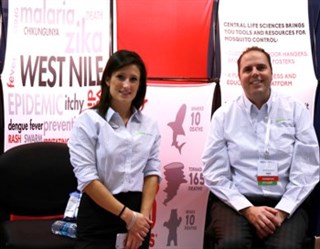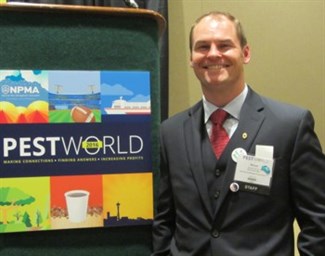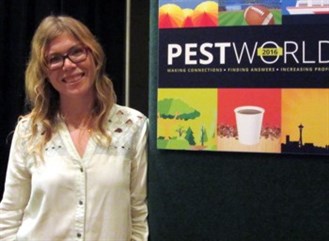With 40 educational sessions, many of them concurrent running over days two and three at PestWorld (19 and 20 October) and then on day four (21 October) a choice of five special themed educational tracks to follow, it pays to study the programme before you arrive.
Pest was only able to dip into a few of these but narrowing them down wasn’t as difficult as first thought. We stuck to the more technical pest-related sessions so were able to discount the host of sessions targeted at managing the business better, such as New overtime rules, The importance of character in the hiring process, Building a winning company culture and the business case for diversity and inclusion. We also ignored the sessions which reviewed the work of organisers, the National Pest Management Association (NPMA) and thinking of our UK readers requirements steered clear of termites, US native ants, wood decaying fungi and most of the mosquito papers.
| Bed bugs get the Dini treatment! Probably the most entertaining and informative of the sessions we attended was the one by Dr Dini Miller from Virginia Polytechnic and State University on Non-chemical solutions for bed bug control. Dr Miller started her presentation by asking her audience to ‘Calm down dears!’ By which she meant that the industry has a huge role to play in stopping the public ‘freeking out’ about bed bugs. She didn’t see how the protocols which insist that people must undertake extensive preparation work before treatment and also make residents destroy all their personal stuff is helping. In her experience many elderly or disable residents cannot do the preparation and therefore decide to live with the bugs. And destroying people’s stuff she felt was equally abusive, especially for those who can ill afford to replace their things. It’s even worse for people with dementia. She concluded that not all infestations are the same and pest professionals need to assess the situation and tailor their approach and price to suit. |

Dr Dini Miller asked us all to ‘calm down’ |
|
|
On a practical level, Dr Miller and her team have been looking at the role of vacuum cleaners and small-scale heat treatments against bed bugs. They have concluded that vacuuming can play a much greater role in bed bug treatments, even if it is just to clean up the dead bugs after treatment making follow-up inspections so much easier. Vacuums are also effective against live bugs, first instars and even eggs. Dini suggested using panty hose (tights to you and me) to collect the bugs inside the cleaner so that they can easily be removed and destroyed. Small scale heat treatment also got the thumbs-up. Nothing new! |
||
| Sounded intriguing Tales from the crypt sounded intriguing but, in fact, turned out to be a clever wrapping for a number of pest management case studies. These underlined basic pest management principles such as making sure you’ve identified the pest correctly and then using your knowledge of that pest’s biology and behaviour to work out where the source of the problem is and how it can be solved. The case studies were in some unusual places including a mausoleum! The session also included a gallop through the different types of resistance (including aversion) seen in cockroaches and bed bugs and a super fast technical explanation of the modes of action of the different chemical groups. Following the science was difficult but the conclusion that chemical controls need to be used in rotation was simple enough. Surprisingly, the educational programme included just one session on Zika. Entitled Zika and the threat of emerging mosquito-borne diseases it proved very popular with standing room only. The threat from Zika is very real in the USA with a total of 4,091 cases reported so far (as of 26 October), 139 of which were locally acquired mosquito-borne cases. Surprisingly too, whilst there were plenty of companies in the exhibition listing mosquito control as part of their business, far fewer than you might have expected were majoring on Zika. One of the few who did so was Central Life Sciences. Rodents on the agenda The positive effects of rodenticides on public health and the environment stood out as a must hear session, if only because the programme summary stated that it would ‘review the latest in rodent management strategies and technologies that promote effective rodent management while mitigating the risk of pesticide exposure to people and non-target wildlife.’ In other words, what the USA is doing about rodenticide stewardship. On the evidence of this session Europe is a good way ahead of the US. The only change discussed to the way anticoagulant rodenticides are used was to consider using non-toxic monitoring baits. However In the question and answer session it became clear that NPMA is already in discussion about stewardship with the UK’s Campaign for Responsible Rodenticide Use (CRRU). The session on Rats as sponges for pathogens – An update from the Vancouver Rat Project by Kaylee Byers from the University of British Columbia was both fascinating and disturbing. It is too early for widespread conclusions to be drawn from this project which is being conducted in the downtown Eastside district of Vancouver. This is an area in the heart of the city, close to major tourist areas but populated by down and outs, many high on drugs and, by all accounts, with a massive rat problem. The project has already established that these rodents are capable of carrying and transmitting not just the diseases we normally associate with rats but also infections such as MRSA, Salmonella, E. Coli and C. dificile. However, the risk of infection varies considerably within the district as the rats live in discreet groups and some groups carry far fewer pathogens than others. For UK visitors, the session was disturbing on two counts. Firstly that, in a rich country like Canada, such poverty and depravation exists and, secondly, because the public authorities do not accept that rats pose any sort of health threat. This is what the Vancouver Coastal Health Authority is saying publicly: “In Vancouver… we know that because we aren’t getting human disease where the vector is known to be rats, we know they are a nuisance, but they are not a public health concern in our area.” Really? |

Tales from the crypt speakers (left to right): Faith Oi (University of Florida), Tom Jarzynka (Massey Services) and Jeff Weier (Sprague Pest Solutions)

The problems associated with the Zika crisis only made pasing reference in the exhibition itself. The Central Life Sciences booth being one

Dr Michael Bentley from NPMA addressed the changes to rodenticide use USA style – a far cry from what is currently happening in Europe

Shocking. The city of Vancouver refuses to acknowledge the threats possed by rats, as detailed by Kaylee Byers from the University of British Columbia

